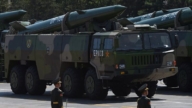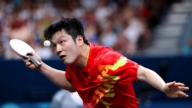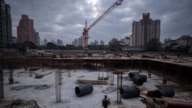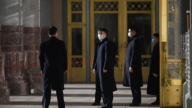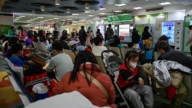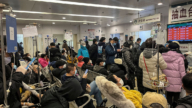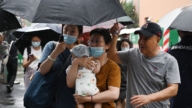【新唐人2012年1月9日讯】中国第四次全国金融工作会议1月7号在北京闭幕。会议的中心议题“控制金融风险”,以“稳”为基调。有学者指出,2012年中国的经济“险像环生、危机四伏”,但在今年中共高层权力交接前,“稳定压倒一切”的前提下,当局能采取的措施极为有限,经济硬着陆已经无法避免。
5年一度的金融工作会议,一向被视为金融业的“风向球”。这次会议主要聚焦规范民间资本、地方债务等金融风险。
在此之前,温家宝在元旦期间视察湖南地区时,曾对未来中国经济形势发出风险警告说:中国正处在经济下滑和物价高位并存的状况,目前问题的核心是市场偏冷。
他坦言:“今年第一季度对中国经济来说可能是困难的”。这增加了人们对中国经济可能大幅下滑的担忧。
而日前,在《搜狐财经》策划的“2012年中国经济形势预测”活动中,上百位知名经济学家、学者和机构,对中国的经济形势普遍持悲观态度。超过96%的学者认为,2012年中国的GDP增速将放缓。
台湾“中华经济研究院”研究员吴惠林教授表示,中国的发展是以资源为代价,现在资源耗尽,给中国造成的这种天灾型的经济灾难更难以解决。
美籍华人律师,《中国即将崩溃》一书的作者章家敦(GORDON CHANG)则认为,全球经济危机,特别是欧美市场需求的衰减,对中国依赖出口的经济影响越来越大。从目前大陆的经济情况看,当局想和2008年金融危机时,以巨额资金投入金融市场来刺激经济,已经不可能。
章家敦:“现在,中国正面临着严重的经济问题。我相信温家宝非常清楚这一点,因此,他正试图降低公众对经济发展的期望。因为他知道现在所面临的问题是他目前根本就无法解决的。这一次,北京当局将不再有2008年经济危机时期的灵活性。因为银行已经被他们自己制造的坏账拖垮,我们目前不清楚这个影响到什么程度,但是这和通胀一样都是他们采取措施的限制。”
据《21世纪经济报导》透露,这次金融工作会议定位于“后危机时期的危机消化”。主题之一是:2009年四万亿刺激政策推出以来,不断涌现的“地方政府融资平台”和膨胀的“地方债务”问题。
报导还说,此前外界讨论的,诸如成立金融国资委、完善金融监管协调机制等议题,这次讨论的不多,这些议题暂时难以形成实质性的成果。
《德国之声》文章认为,中国的经济及社会体制已显现诸多裂痕,社会在分化,差距愈发大,与之相伴的则是越来越频繁的群众抗议事件。而今年秋天,中共还面临领导层换届。在权力交接完成之前,依旧是“稳定压倒一切”。
章家敦也表示,今年开始的中共领导人政治交接,影响了北京不能采取有效行动。目前北京技术官僚可以实行的只会是微不足道的措施。
章家敦:“我不认为他们(中共)能实现经济软着陆。相反,中国的经济将会是非常非常硬的硬着陆。”
新唐人记者秦雪、李明飞、葛雷采访报导
Hard Economic Landing for China: Risk Control Focus of Financial Conference
The 4th National Conference on Financial Work concluded
on January 7th in Beijing.
The theme of the conference is how to control financial risk
in order to maintain social stability.
Scholars commented that, China’s economy is facing a
profoundly dangerous future in 2012.
However, the Chinese Communist Party (CCP) will carry out
a power handover this year.
It will follow the principle of “stability overrides everything”
in a more thorough way.
This restricts the available regulatory measures to a very
limited range.
Therefore it is almost unavoidable that China’s economy
will make a “hard landing”.
The National Conference on Financial Work, held every five
years, is a “weather vane” for future financial policies.
It focused on financial risk control, including regulating
non-governmental capitals, and dealing with local debts.
On New Year’s Day, Chinese Premier Wen Jiabao warned
on China’s future economy, while visiting Hunan province.
He said economic decline and high CPI were both present
in China.
The fundamental problem still lies in the market slump.
Wen has admitted that, the first season in 2012 will probably
be a difficult one for China’s economy.
These words have induced increasing worry that China’s
economy will plummet very soon.
The business channel at sohu.com invited economists,
scholars and institutions to predict China’s 2012 economy.
Most appeared pessimistic, with more than 96% of scholars
agreeing that China’s GDP growth will slow down this year.
Prof. Wu Huilin, a Senior Researcher at the National Institution
on Economic Research in Taiwan, commented on the issue.
China was a developing economy, at the cost of over-using
it’s natural resources.
Now those resources are almost completely consumed,
which causes an inevitable calamity for the economy.
Gordon Chang, American lawyer and author of “The Coming
Collapse of China” discussed this issue.
The global economic crisis, especially the sharp decline in
demand from Europe and US, had an enormous effect.
China is an export-dependent economy, and under the
current situation it has been impossible for the CCP to
invest money into the financial market again, as it did in
2008 to support growth.
(Gordon Chang): ”China’s economy is in great trouble now.
I believe Wen Jiabao is very clear about this, and that’s why
he is trying to lower public expectations on economic growth.
He knows there’s no way to resolve those problems in a
short period.
Also, this time the CCP regime no longer has make choices,
like it had in 2008.
The banks have crashed, due to vast amounts of debt,
though we are still not sure on what effect this will have.
Just like inflation, this limits the available choice in dealing
with the problem.”
According to 21st Century Economic Report, the theme of
the conference was “crisis management at a later stage”.
One of the subjects is how to deal with the continuously
emerging “local governmental financing platforms”.
It also looks at how to deal with exploding local debts, after
the 4-trillion Yuan’s stimulus to boost the economy in 2009.
The report also mentioned that, during the conference
there’s little discussion on many expected topics.
This includes setting up a new agency in managing
state-owned assets.
It also includes improving financial activity supervising
systems. No substantial progress has been made.
An article by Deutsche Welle commented many problems
are emerging in China’s economic and social systems.
The gap between the rich and the poor is expanding,
which is accompanied by more mass protests.
This autumn there’s a new round of power handover
inside CCP.
Before the handover, “stability overrides everything” will
still dominate all governmental decisions.
Gordon Chang made a similar comment, that officially, the
CCP will only carry out some minor steps this year.
The power handover will prevent the CCP from taking any
effective action on economic problems.
(Gordan Chang):”I don’t think the CCP can land its
economy softly.
On the contrary, China’s economy will suffer a hard landing,
probably a very hard one.”
NTD reporters Qin Xue, Li Mingfei and Ge Lei



